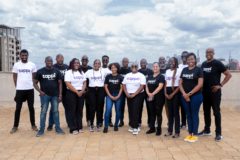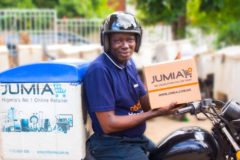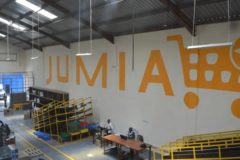When the COVID lockdown was announced in March 2020, people stampeded shops to buy many months’ worth of food and supplies to the extent that many economies experienced shortages with food products, medical materials, toilet paper, and even home workout equipment. The lockdown was the closest thing to an apocalypse most people had experienced up to that point, and they wanted to be prepared.
In Namibia, the pandemic also affected retail shops. The government had locked down the country without making adequate palliative plans to support its people during the period. Taxis didn’t run and shop owners couldn’t transport themselves to and fro their suppliers for goods.
In the midst of the crisis, it soon became apparent that Namibia had a broken supply chain.
One man, David Akinin, who once worked in the construction industry as a founder, decided to intervene. He loaded his truck with food and essential supplies and drove around, selling them to people—a sort of mobile retail shop. They were grateful for his intervention. But it wasn’t enough; informal shops needed to reopen.
Akinin’s idea to provide food and essentials to people during lockdown gave birth to a company—Jabu. “When you’re building something and people start thanking you for it, you know you’ve found something great,” Akinin told TechCabal on a call.
Jabu partnered with local and multinational suppliers to deliver their goods directly to informal retailers across Namibia. In the process, they faced a challenge: it was difficult to locate retailers who didn’t have registered or verified addresses. The startup then worked with local community leaders to register retailers in their area and log the GPS location of each shop in the Jabu app. Within 2 weeks they identified the location of 1,000 shops.
Headquartered in Namibia, with operations in Zambia, Jabu is a data-driven e-commerce startup that helps small retailers with sourcing products and inventory management. Its platform connects over 6,000 retailers to local and international suppliers; and digitises their orders, payments, and logistics. The startup currently operates out of 5 cities and 9 sites.
Mid-2021, Jabu raised $3.2 million in seed funding, led by Afore Capital, with participation from Y Combinator, FJ Labs, Quiet Capital, Kli Capital, Pareto Capital, and unnamed angel investors.
The funding makes Jabu the first Namibian startup to be backed by YC.
Sceptical investors
Akinin, who is founder and CEO of Jabu, is originally from Venezuela but has lived in Namibia for 9 years. When he got on the call with TechCabal, he was outdoors, seated in a veranda overlooking vibrant greenery. He was in Zambia, he said, where Jabu had opened an office in November last year. He would later reveal that it had been raining a lot in the Zambian capital, Lusaka, affecting Jabu’s fleet operations.
The supply chain problem Jabu has set out to solve is a thorny one, and the solution it is building is critical to economic development. Yet, for a long time, the startup struggled to attract investment. “Our first challenge was getting investors to recognise the country,” Akinin said. “I’m sure a lot of people, on their first call, looked up Namibia on the map!”
Investors Akinin approached were concerned about Jabu’s potential to scale in Namibia, a country whose economy went into recession in 2016 and has been struggling to recover ever since.
At the onset of the pandemic, the African Development Bank Group (ADBG) projected
Now, although the economy is expected to make a rebound, albeit a slow one—with growth projected at 1.2% in 2021 and 2.4% in 2022—one can see that the country has had a rough few years, which may have caused it to miss out on the Great Venture Capitalist Influx Africa has recorded in the last 3–4 years.
Moreover, it is well known that venture capitalists (VC) channel most of their African investment towards startups in South Africa, Egypt, Nigeria, and Kenya. These countries—dubbed the Big Four—are Africa’s busiest tech markets; compared to them, Namibia has a tiny population—2.5 million persons, where Nigeria has 206 million, Egypt 102 million, South Africa 59 million, and Kenya 53 million.
And so, it is against this backdrop that investors were concerned about Jabu’s scalability. Their recurring question was whether Namibia could produce a startup that could be worth $100 million in returns, and Akinin’s answer—precise each time—was yes.
“A huge responsibility”
Reflecting on Jabu being the first Namibian startup to be backed by YC, Akinin said, “It feels like such a huge responsibility, for us, towards an ecosystem that has been trying, for a long time, to raise awareness about the great things happening in Namibia. But it’s a good opportunity to bring people into the Namibian ecosystem and onto our platform. It’s inspiration for other companies still pushing hard and hoping to get more money this year.”
Akinin believes that the Namibian startup scene will get more funding attention now because there is an “an openness to innovation” from both local founders and investors. “Investors around the world are opening their eyes to the understanding that there is opportunity in Namibia. I served as an ambassador of what’s happening on the ground and was fortunate to have been able to share that story with investors.”
A tale of 2 countries
For a young startup, Akinin and his team remain undaunted by the challenges associated with operating in 2 different markets. For starters, they are dealing with unstable infrastructure in both Zambia and Namibia. And while there are frequent power outages in Lusaka, unlike in Windhoek, in both countries, more than half of Jabu’s customers are in places without tarred roads, making logistics difficult: “You can see why the supply chain does not exist, in the first place,” Akinin said. “Because there are no roads to the places we need to reach. We’ve had to map roads that didn’t exist previously in order to create a route to market.”
In Lusaka, incessant rains have made movement on potholed roads near-impossible—“It has got to the point where I’m willing to invest in paving the road in front of our warehouse, just so that our vehicles can move smoothly.”
He described Lusaka as a “billboard city” but is unsure yet how to leverage that fact for Jabu’s growth in the country. “There’s advertising everywhere,” he said. “Marketing and branding are a really different experience to what we have in Windhoek. We’re very excited about getting to know it and taking some learnings from it back to Namibia.”
On to the next round
African e-commerce startups have recorded an impressive spike in VC funding since 2019, raising nearly $90 million dollars in 2020, up from $47.5 million in 2019. Between Q2 2020 and Q2 2021, the total value of raises by e-commerce startups hit $140 million. The spike in funding may have been triggered by the lockdown, as the pandemic emphasised the gaps in the supply chain of many industries, forcing e-commerce entrepreneurs to innovate around the problem.
Following its raise last year, Jabu is looking to expand to other countries in Southern Africa—Botswana, South Africa, Lesotho, and Eswatini. The path to this expansion is still being developed and fine-tuned by the team. For now, however, Akinin’s focus is on raising for Series A and consolidating his company’s operations in Zambia.






















